When I first spoke openly about experiencing recurrent miscarriage, people flooded my inbox with solidarity and questions. Many told their own stories–usually stories I’d never heard. Many others were in the throes of miscarriage grief, and they came to me to vent, seek advice, learn what to expect, and get tips for coping with miscarriage.
This article answers the many questions people have asked me, plus provides the resources I’ve developed as a result.
Here you’ll find the following types of information:
- Tips for coping with miscarriage emotionally
- Tips for dealing with miscarriage physically
- What to expect when you miscarry at different stages of pregnancy
- What to expect down the road
- Ideas for memorializing your loss as a way to cope
- How others can support you through pregnancy loss

This site contains affiliate links, meaning that we earn a small commission for purchases made through our site. We only recommend products we personally use, love, or have thoroughly vetted.
Miscarriage Grief Is Different For Everyone
Miscarriage grief is a new kind of grief, one that many women understand, but which few talk about openly.
One of my most frequently asked questions is, “How long does it take to heal after a miscarriage?” My annoying answer is “It depends.” I grieved my first miscarriage very actively for a week, somewhat actively for a month, and still occasionally, but minimally, 4 years later. I didn’t grieve my third loss at all. Every loss is different for everyone.
This brings me to 2 essential points to keep in mind as we talk about miscarriage grief.
- Not everyone experiences the same level of grief. Some women will actively grieve a loss for month, while others cope with miscarriage easily. There’s no one-size-fits-all model.
- Let yourself experience grief as it comes to you naturally. Many of us try to repress our emotions because we don’t want to feel them–they bring up too much, they’re too hard, they keep us from our jobs, our partners, our living children, our lives. But if you do not allow yourself to feel your grief, it will come up later in far more dangerous ways. So allow yourself the time to feel it. And if it genuinely isn’t there, or is very short-lived, that’s okay. There is nothing wrong with you. Miscarriage grief affects everyone differently.
This isn’t true for everyone, but I’ve noticed women who work in the medical field dealing with miscarriage more easily than many other women. I believe this is because they really understand the statistics. We all know the statistics, see the “I am 1 in 4” memes in October. But women who work in that field see it. They actually understand. And so, in my experience, their grief tends to be less.
That doesn’t mean that some women who work in the medical field won’t grieve a miscarriage the way we all would. But it’s a useful example of the many ways in which we all experience loss differently.
Not only does every individual cope with miscarriage differently, but we all experience different levels of miscarriage grief. This is okay.
Tips for Coping with Miscarriage Emotionally
One of the biggest tips I can give for coping with miscarriage grief is actually a precursor to pregnancy itself. You need to understand, before you ever conceive, just how common miscarriage actually is. An estimated 1 in 4 pregnancies ends in miscarriage. Really understanding that can make a huge difference because you’re less blindsided if miscarriage occurs.
That said, there’s still grief, and if you’ve found this page, you’re likely grieving. People often ask me questions like, “How do you overcome a miscarriage?” and “What should I do after miscarriage?”
Again, the answer is that it’s different for everyone, but many of the general principles work for most people. Here are my experience-based tips for coping with miscarriage grief:
- Talk about it. If you’re comfortable talking to others about your experience, do it. You’ll be shocked by the number of women who have been there and who want to support you, love you, and tell you their own stories.
- Write about it. If you aren’t comfortable talking about your experience yet–or even if you are–write about it. Whether you’re into journaling or not (I’m not, and I’m a writer), putting your emotions on paper gives you a physical outlet. Just like talking, your emotions exit your body and pour onto the page. They may remain in your body, as well, but this release is important. Also, you’re likely to be more honest about your feelings in writing than you are when talking, and owning up to your true feelings is essential.
- Read other people’s miscarriage stories. We know, realistically, that a lot of people have experienced miscarriage and grief. But reading their stories is tangible proof that we are not alone. You may find yourself crying through some of these stories, and that’s great. You need to release your emotions (and crying is a great outlet). So, reading others’ stories can be extremely cathartic. Scroll down for links to multiple miscarriage stories.
- Don’t compare your grief to others’. Just because your friend cried twice doesn’t mean you can’t ache at the sight of a pregnant belly for the next year. This is your story. It’s your experience. Do it your way.
- Memorialize your loss. I’ll talk more about this in a later section, but taking the time to memorialize your loss can help give you tangible closure.
- Seek professional help if needed. If you fear that you aren’t responding to your loss normally, or remain unable to emotionally function after a couple of weeks, consider seeking professional help.
How Do I Find Professional Help?
My favorite resource is Postpartum Support International (PSI). Most people in the network are trained in miscarriage grief and loss. They will help you find a healthcare provider in your area.
Contact the PSI 24-Hour Helpline at 1-800-944-4773 or TEXT 503-894-9453!
Don’t want to call a postpartum hotline after miscarriage (even though they can help)? I understand. Find a qualified counselor, therapist, or psychiatrist.
Ask your friends and family for recommendations. if you’re uncomfortable asking, go online. If you don’t think you want or need medication, check out the Psychologist Locator from the American Psychological Association or Find a Psychologist. If you think medication may be necessary, find a psychiatrist through the American Psychiatric Association.
Miscarriage Stories
One thing that can really help when you’re losing a pregnancy is reading other people’s stories. Check out the following stories, all about different experiences with pregnancy loss, to find people who can relate to you.
“Recurrent Miscarriage: What It Was Like Surviving the Darkness”
Read Katy’s recurrent miscarriage success story. She had 4 losses before having a living child. It walks you through her experience, including trying to conceive, loss, fertility testing, and eventually finding answers.
Fathers Dealing with Miscarriage Grief
Learn how with miscarriage grief, fathers feel it too. Yes, a woman’s body experiences the loss, but her partner experiences the emotional loss, as well. In this post, we hear from a father about the emotional struggles he encountered as his wife lost 2 pregnancies.
Beth’s Ectopic Pregnancy Story: How Talking About it Can Save a Life
Beth’s ectopic pregnancy story walks us through her journey of sudden symptoms, surgery, and the loss of one fallopian tube. It highlights the importance of knowing the signs of ectopic pregnancy and getting treatment as soon as possible.
From Back-to-Back Miscarriages to Raising 3 Daughters
In “From Back-to-Back Miscarriages to Raising 3 Daughters,” Whitney tells her story of experiencing 2 miscarriages, virtually in silence. She discusses the anxiety she experienced in later pregnancies, as well as her struggles comparing her grief to others’.
Tips for Coping with Miscarriage Physically
One of the most frustrating (though not usually most upsetting) parts of pregnancy loss is not knowing what to expect. Here’s the thing. Every miscarriage is different.
But there are a few things you should know, and have on hand, to help you cope with the physical pain of miscarriage.
- You will cramp, and it’s more than period cramping (the further along you are, the worse your cramps are likely to be)
- You will bleed, likely heavier than a period (the further along you are, the more bleeding you will experience and the more blood clots you are likely to pass)
- You could contract (if you’re past about 10 weeks gestation, your uterus will experience contractions to push everything out. That means that yes, you go through a mini labor.)
Whether you miscarry naturally or have surgery, you’ll need a few basic supplies.
- Large maxi pads. Depending on the type of loss, you’ll eventually graduate to smaller, less intrusive maxi pads
- A heating pad for cramps. I suggest an electric heating pad because it always works and doesn’t require you to move, plus at least one microwavable heating pad because it can move with you. It’s also easier to adjust the position. I like this one because it also gives you something to snuggle.

- Pain relievers, if you’re the medicine-taking type. I sometimes needed doctor-prescribed pain relievers, but was largely reliant on Aleve.
Expect to be inactive for a few days, whether you have surgery or miscarry naturally. The thing to know about natural miscarriage is that it may not all happen at once.
Some women cramp, bleed, and pass everything at once. Others begin to miscarry but don’t finish for weeks.
Learn about all the possibilities in detail in the article below, or scroll within the article to find the type of miscarriage you’re having.
What To Expect When Miscarrying
Everyone’s body is different. There are different types of miscarriage, and each type of loss is different and has different stages. We’ve tried to account for all the variables in “What To Expect When Miscarrying.”
7 Things I Never Knew About Miscarriage
We didn’t write this one, but that doesn’t mean it’s not helpful. In “7 Things I Never Knew About Miscarriage” on Being the Brothers, Shalynn talks about different things that surprised her about her own experience with coping with miscarriage both physically and emotionally.
What To Expect Long-Term
For most people, miscarriage is a one-time thing, and your conception journey will (hopefully) look relatively normal.
That said, there is a slight chance that you’ll experience more losses. Specifically, a 1/100 chance.
If You Experience Recurrent Pregnancy Loss
If you lost 2 pregnancies back-to-back, and especially if you experience 3 consecutive losses, read “Recurrent Miscarriage Testing: What You Need to Know.”
This article outlines when you need to be tested for recurrent miscarriage, what to expect from testing, and includes a downloadable checklist of tests to ask your doctor about.
If You Conceive a Healthy Pregnancy
The vast majority of women who are forced into coping with miscarriage will experience a healthy pregnancy the next time around. 99/100 women will go on to have a healthy pregnancy the very next time.
This is when your miscarriage grief can really come back to surprise you. In the span of trying to conceive (or not trying, if you weren’t interested in being pregnant before your loss), future pregnancies, childbirth, and parenting, grief and trauma from your miscarriage will likely sneak up on you.
You may notice yourself thinking of the pregnancy you lost, or you may feel especially anxious about your future children.
The following articles are written specifically to help you through these struggles.
Pregnancy Anxiety After Miscarriage
This article explains why anxiety is more prevalent in pregnancy after loss, and provides experience-based advice on coping with pregnancy stress.
5 Tips for Coping with Pregnancy After Miscarriage
This post provides 5 actionable tips for coping with pregnancy after miscarriage, whether you’re dealing with severe anxiety or not.
Having a Rainbow Baby
Having a baby after experiencing miscarriage grief can be both thrilling and very overwhelming.
Many women are not prepared for the negative emotions that accompany this experience. Learn more about the complicated nature of having a rainbow baby.
How to Deal with Postpartum Anxiety
Postpartum anxiety may seem an odd subject to bring up in a post on coping with miscarriage. But research indicates that new moms with a history of trauma (reproductive or not) are more likely to experience postpartum mental health issues like postpartum depression or anxiety.
My experience leads me to believe that knowing your risk for a postpartum mental health disorder actually makes you less likely to experience it (I have not looked for research to support this claim). So I want you to know about the possibility.
Learn more about the difference between postpartum depression and anxiety
How to Memorialize Your Loss
One of the most difficult aspects of miscarriage is that it’s such an abstract concept. In most (but not all) cases, a mother was not yet showing and could not yet feel her baby kick at the time of loss.
What that means is that she’s been imagining a life with nothing more to see of it than 2 lines on a pregnancy test and, perhaps, ultrasound photos.
In most cases, there’s no gravesite to visit, no funeral for closure. Woman have reported choosing to miscarry naturally specifically so they can get the closure of the experience, worrying that having surgery will not provide it.
There are a few ways I’ve found to memorialize lost pregnancies, and they’ve really helped me cope with miscarriage.
- Find or make something that symbolizes a memorial. I have a pearl ring that I got after my first loss. That baby’s due date was in June, so I choose a pearl because it’s the June birthstone. Many women purchase jewelry on Etsy, get tattoos, and more.
- Have a ceremony. This can look so many different ways. Some people have funerals; others have private memorials with just their partners, or even alone. I chose to wait until my first due date to have a small, silent candle lighting with Husband. At that point, we were lighting candles for 3 angels.
- Create a space in your home. We have what I call our “shrine” on a bookcase in the living room. It has the 3 candles we lit on our first angel’s due date, plus an additional candle for our 4th loss. It also has 4 wooden angels, and a piece of art that represents the tree of life. This way, our angel babies will always be at home here.
Read more about ritualizing lost pregnancies on my post “Creating Grieving Rituals” on the Atlanta Area Moms Blog.
Help Others Help YOU Cope with Miscarriage
When you’re dealing with miscarriage grief, the last thing you want is to feel responsible for teaching others how to help you. I know, it’s totally unfair.
But truth be told, we’ve spent centuries not discussing this subject. Because of that silence, I’ve noticed 3 things.
- People don’t realize how common miscarriage is
- We, as a society, don’t know how to talk about it
- Most people, including many who have experienced miscarriage, don’t know how to help
These are frustrating truths, but truths none-the-less. That’s why Undefining Motherhood is constantly working to create more resources to help us, as a society-at-large, better understand pregnancy loss.
Instead of listening to hurtful comments or telling people you don’t need anything when you really, REALLY do, just send them to the following links.
Or, to make your life even easier, send them this page and say, “Scroll down to the bottom. It’ll tell you what to do.” Hopefully, you’ll get the help you need without having to do the teaching.
The following resources are meant to help us all better understand how to support those we love through loss.
“What (Not) To Say To Someone Who Had a Miscarriage”
Remember that someone coping with loss is living in a state of grief. When we are grieving, our brains process information differently than they otherwise would.
As such, it’s important to consider how your words and actions might be perceived by the griever. Saying what makes you feel better is unlikely to make the griever feel better. Our words often exacerbate miscarriage grief.
Learn more in “What (Not) to Say to Someone Who Had A Miscarriage.” While these tips are specific to miscarriage, many (but not all) translate to to infant loss and other types of grief.
Helping a Friend Through a Miscarriage
Although you can’t fix the problem when someone is coping with miscarriage (and you shouldn’t try to), you can be there for the people you love.
Giving them a shoulder to cry on, listening without offering advice, sending a small something to remind them you’re there–all these things can make a huge difference in supporting someone who is coping with loss.
Learn more about how to support someone after a miscarriage. These tips are applicable to most types of grief and loss, not just miscarriage.
Why We Really Need to Talk About Grief
Many people, but not all, who are coping with loss or grief feel the need to talk about it. Unfortunately, they don’t always feel like they have people who are willing to listen, especially without offering advice or useless platitudes to “make them feel better.”
Keep in mind that, no matter how uncomfortable you may feel discussing someone’s grief, they’re always thinking about it. If they want to talk about what they’re feeling, let them. Don’t force them, but allow them a safe space to speak if they need it.
Follow their lead, and allow yourself to be uncomfortable for their sake.
Learn more in “Why We Really Need to Talk About Grief.”
Don’t Compare Their Grief to Someone Else’s
Someone will always have it worse, but that doesn’t change the experience each individual goes through. Avoid minimizing a griever’s experience by making comparisons.
(This is equally important for the griever, who is likely to make their own comparisons and, thus, invalidate their own feelings.)
Learn more in “Please Don’t Compare Your Grief to My Own” on Bella Brita. –an article we didn’t write but find very helpful.
For more resources on helping others coping with grief, check out Dr. Christina Hibbert’s “The Do’s and Don’ts of Helping Others Through Grief.”
Other Resources
For a good wrap-up of all of the above information that you can listen to in the car or as you have free time, check out my episode on Dr. Christina Hibbert’s Motherhood 2.0 Podcast. You can hear the episode where I’m the featured guest, “Coping With Miscarriage and Perinatal Loss,” for free on iTunes or SoundCloud.
Additional Resources for Coping with Miscarriage
Looking for support in your local area? Postpartum Support International can help. Most of their therapists are trained in grief and loss, including perinatal loss.
Struggling with grief? Dr. Christina Hibbert’s series on grief provides some great information and resources.
Need an online community? Online miscarriage support groups abundant.
You can also find general facebook groups for pregnancy loss, and probably for the specific type of loss you’re experiencing. If you type “blighted ovum,” “chemical pregnancy,” etc. into Facebook, you’ll likely find a support group that understands your specific situation.
Miscarriage Support Journal
With our journal for the sisterhood of pregnancy loss, called Mourning Retreat, miscarrying mothers have the opportunity to work through their emotions and gain access to a private online community of women who have been in their shoes.
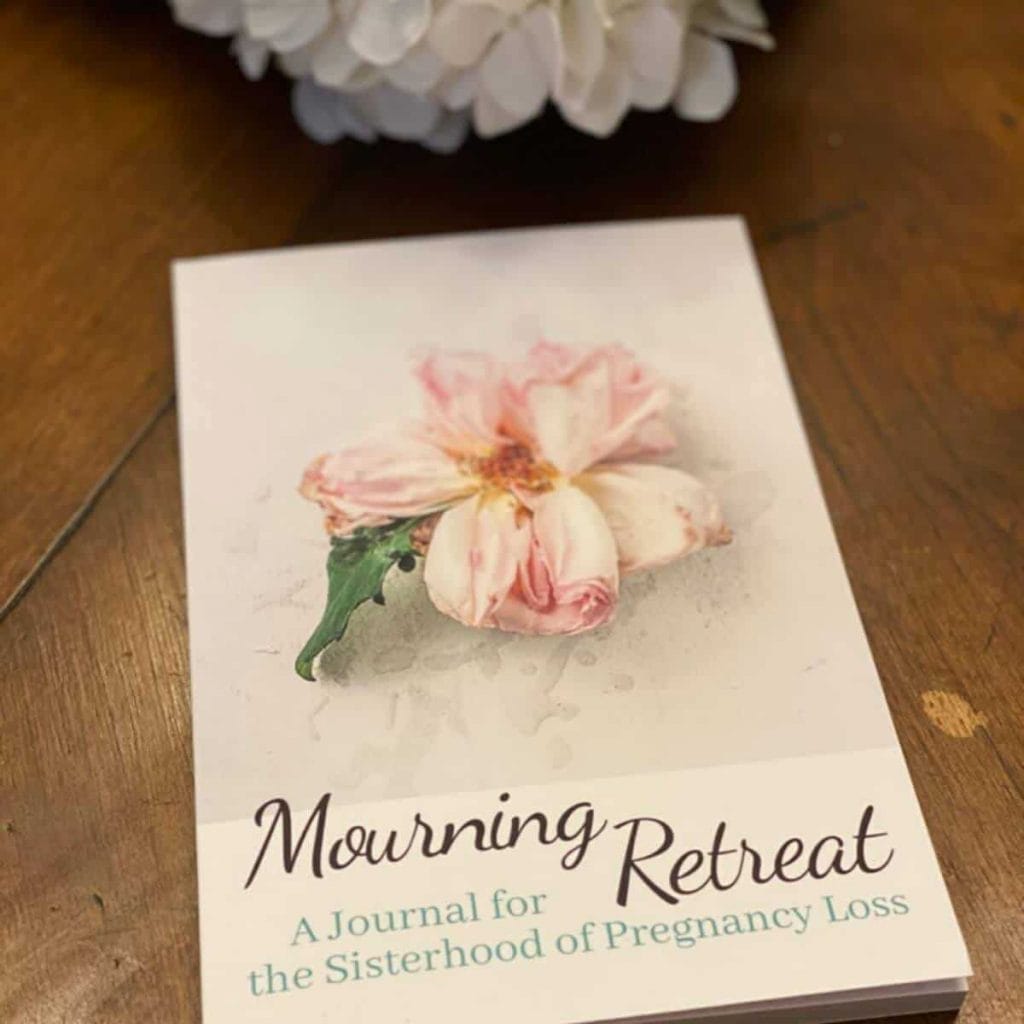



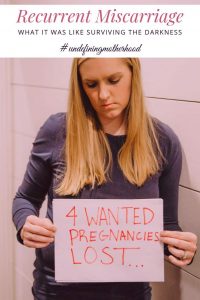


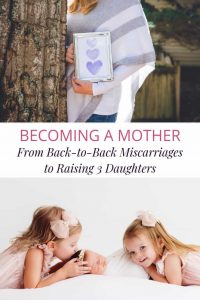





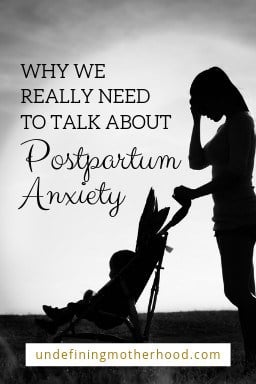
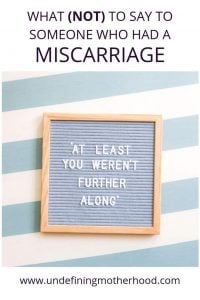











5 thoughts on “Coping with Miscarriage: Helpful Tips for Surviving Grief”